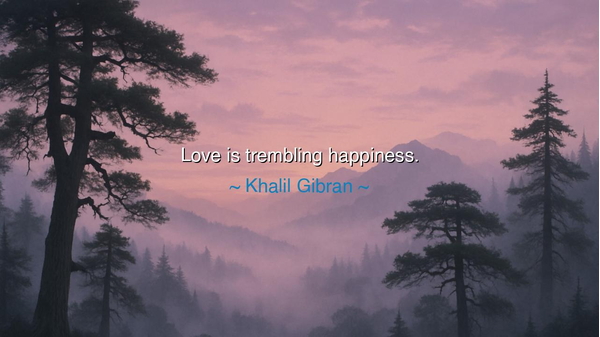
Love is trembling happiness.






The words of Khalil Gibran — “Love is trembling happiness.” — flow like a river of gold through the human heart. In their brevity, they contain the vastness of all feeling: the sweetness and fragility of joy, the beauty and terror of vulnerability. Gibran, the mystic poet of Lebanon, understood that love is not a tranquil state, but a living flame — trembling, uncertain, yet luminous. It is not mere delight, nor mere sorrow, but the sacred union of both. For to love deeply is to stand at the edge of ecstasy and fear, to hold happiness so pure that one trembles lest it be lost. His words are the song of every heart that has dared to open itself to another.
Born amidst the hills of Lebanon and matured in the spiritual silence of solitude, Gibran lived between worlds — the East and the West, the physical and the divine. His writings, especially The Prophet, were not mere poetry but revelation. He saw love not as possession or perfection, but as surrender. When he spoke of trembling happiness, he spoke of the human heart in its most divine moment: the instant when joy is so intense it frightens us, when happiness quivers beneath the knowledge of its own impermanence. For love is both a gift and a wound; it is the sun that warms and the flame that burns. To love is to be brave enough to tremble.
This trembling is not weakness, but the sacred trembling of creation itself. When the universe was born, it too trembled — light bursting forth from the void, life emerging from silence. Likewise, when love awakens in the human soul, the same vibration occurs: the trembling of wonder, of awe, of the unknown. Gibran reminds us that happiness in love is not calm and complacent; it is alive, like the beating of a bird’s heart in one’s hands. The trembling is the sign of its truth — the proof that it moves us beyond control, beyond safety, beyond the small boundaries of the self.
Consider the story of Antony and Cleopatra, two souls who loved with such intensity that their union shook empires. Their love brought them both triumph and ruin — joy so fierce it defied reason, sorrow so deep it consumed them. In their embrace, the boundaries of courage and madness blurred, just as Gibran described. Though their end was tragic, their love burned with a trembling happiness that defied the cold judgment of history. It was not safe, but it was real — proof that the greatest loves are not calm harbors, but storms of the spirit through which the soul learns its strength.
Gibran’s insight is not a warning against love’s trembling, but a call to embrace it. For he knew that the trembling heart is the living heart — the heart that feels, that risks, that dares to be open. To seek happiness without trembling is to seek warmth without fire, light without sun. The trembling is the price of love’s truth. It is the heartbeat of devotion, the quiver of the soul standing naked before the infinite. Those who refuse to tremble, who wall themselves against vulnerability, may escape sorrow — but they will never know the ecstasy that gives life its meaning.
Yet this trembling does not only belong to the passion between lovers. It lives in every act of love — a mother’s tears as she holds her newborn, the artist’s hand as he paints what his soul sees, the friend who forgives, the stranger who gives without reward. In all these moments, love trembles, for it reaches beyond the self toward something divine. Gibran saw this trembling as the sacred pulse of existence, the same force that binds stars together and calls souls toward unity. It is not perfection, but participation in life’s holy uncertainty.
So, let this wisdom be engraved upon your heart: love is trembling happiness. Do not seek to still the trembling, for it is the sign of life itself. When you love, do not ask for safety; ask for truth. Allow your heart to quake beneath the weight of feeling, for it is in that trembling that you touch eternity. Do not fear the fragility of joy — for it is only by trembling that we prove we are alive, and only by daring to tremble that we learn the divine courage to love.
And when love visits you, as Gibran taught, let it move you wholly — to laughter and tears, to silence and song. For the trembling is the blessing, the bridge between fear and rapture, between the human and the divine. In every heartbeat, in every breath, let your soul remember: love is not stillness, but trembling happiness — the beautiful, fragile proof that even in this mortal form, we are capable of eternity.






AAdministratorAdministrator
Welcome, honored guests. Please leave a comment, we will respond soon